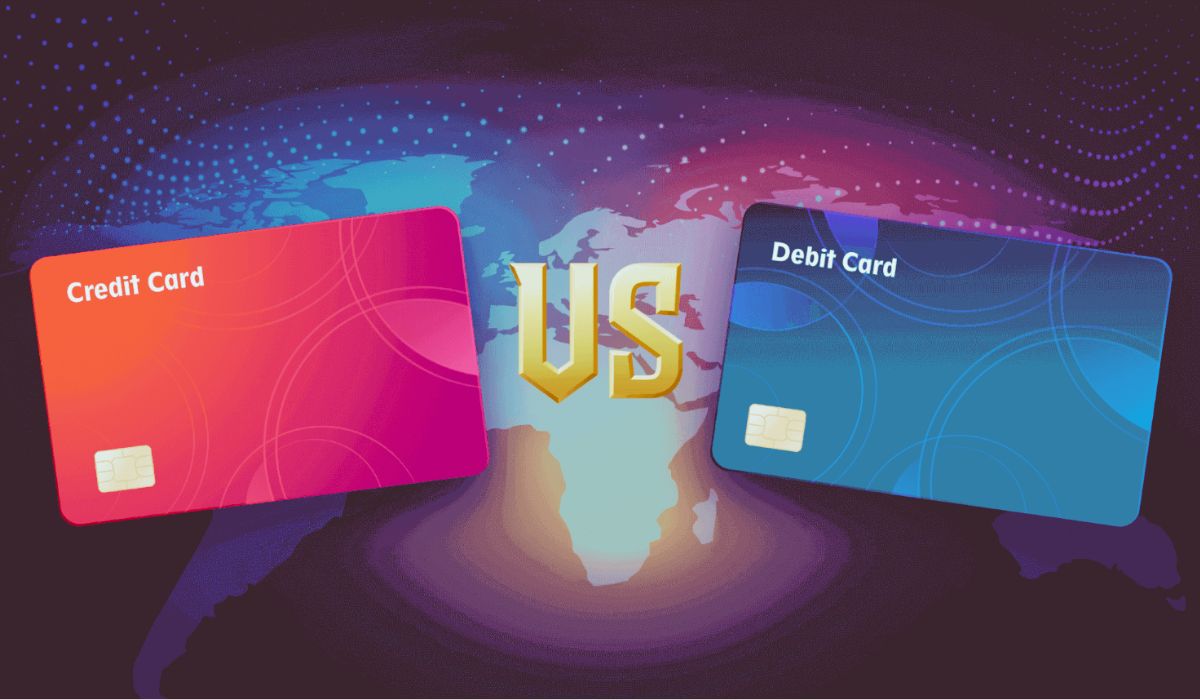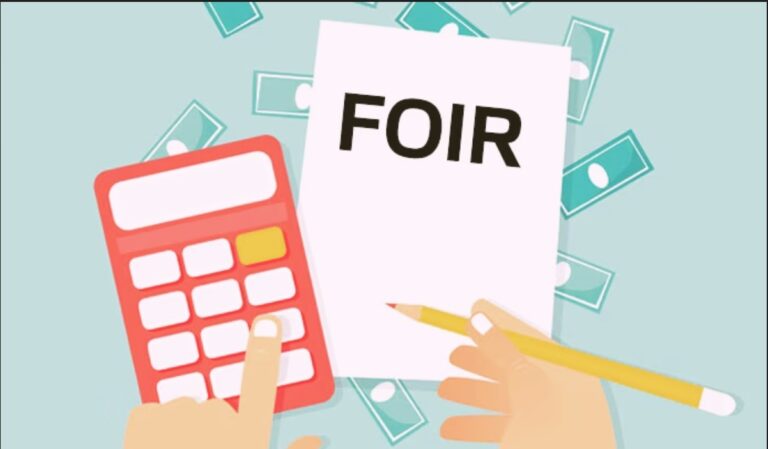Debit cards and credit cards are considered similar however both are different in many aspects. Both cards have 16-digit numbers and operate on an OTP basis but there are a lot of factors that make them alike. For instance, debit cards are linked to a bank account and can be used to both withdraw money and use for online payment. Whereas, credit cards are not linked to any bank account and these come with a defined credit limit. Go through this article to learn the complete details related to the major differences between credit cards and debit cards.
What is a Credit Card?
A credit card is a financial instrument that allows individuals to borrow funds from a lender up to a specified credit limit for various purchases. Users can make transactions without immediately paying cash, but they must repay the borrowed amount, often subject to an interest rate. Additionally, credit cards may incur various fees, such as annual fees or late payment charges that impact the overall cost of borrowing.
What is a Debit Card?
A debit card is a payment card linked directly to a bank account, allowing users to access their funds for transactions without borrowing. When making purchases, the amount is deducted immediately from the associated bank account, promoting responsible spending. Debit cards often come with a daily limit on withdrawals or purchases to enhance security and manage funds effectively. While they typically have fewer fees compared to credit cards, users should still be aware of potential charges, such as ATM fees or overdraft fees.
Key Differences Between Credit Cards and Debit Cards
Understanding the key differences between credit cards and debit cards is essential for making informed financial decisions. While both serve as convenient payment methods, they operate distinctly in terms of funding sources, payment processes, and associated benefits. Go through the table below to learn about the key difference between debit cards and credit cards.
| Feature | Credit Card | Debit Card |
| Source of Funds | Borrowed money from the credit issuer | Directly from the user’s bank account |
| Payment Method | Allows for purchases on credit, to be paid back later | Immediate deduction from bank account |
| Interest and Fees | May incur interest rates on unpaid balances; possible annual fees | Generally lower fees; overdraft fees may apply |
| Credit Score Impact | Can positively or negatively affect credit score based on usage | Does not impact credit score |
| Fraud Protection | Typically offers robust fraud protection policies | Limited protection; relies on bank policies |
| Rewards and Incentives | Often provides rewards, cashback, or travel points | Rarely offers rewards or incentives |
Credit Card Benefits
Credit cards offer numerous benefits that enhance the purchasing experience for users. With features like cashback, discounts, and rewards, they provide incentives for everyday spending. Here are some benefits offered by the credit cards:
- Cashbacks
Many credit cards offer cashback programs that provide a percentage of the amount spent back to the cardholder. For instance, a card might offer 1% cashback on all purchases and higher percentages for specific categories like groceries or fuel.
- Discounts
Credit cards often come with exclusive discounts and promotional offers from a wide range of retailers and service providers. Cardholders may receive special deals on shopping, dining, travel, and entertainment. These discounts can significantly reduce the overall cost of purchases, making it more economical to use a credit card rather than cash or debit.
- Rewards
Credit cards frequently have rewards programs that allow users to earn points for every dollar spent. These points can be redeemed for various benefits, including travel rewards, gift cards, merchandise, or even cash. Some cards offer bonus points making it easier to accumulate rewards quickly and enjoy experiences or products at a lower cost.
- Zero Liability Insurance
One of the most significant advantages of using a credit card is the zero-liability insurance feature. This means that if your card is lost or stolen, or if unauthorized transactions occur, you are not held responsible for those charges. This added layer of security protects your finances and gives you peace of mind while using your card for purchases.
- Flexible Payment Options
Credit cards provide flexibility in how you manage your payments. You can choose to pay off your balance in full each month to avoid interest charges, or you can make minimum payments and carry a balance, which allows for greater financial flexibility in managing cash flow.
| Also, check: Apply for Personal Loan in India |
Debit Card Benefits
Debit cards provide a convenient way to access funds directly from your bank account while offering various benefits that enhance the shopping experience. The following section can be checked to learn about the detailed debit card benefits:
- Discounts
Many debit cards come with partnerships that offer exclusive discounts at various retailers and service providers. Cardholders can enjoy reduced prices on everyday purchases, travel, dining, and entertainment, making it easier to save money while spending.
- Cashbacks
Some debit cards offer cashback rewards on purchases, allowing you to earn a small percentage back on your spending. This feature can help you save money over time and provides an incentive to use your debit card for everyday transactions.
- No Annual Fees
Unlike many credit cards, most debit cards do not charge annual fees, making them a cost-effective option for managing your finances. This means you can enjoy the benefits of a debit card without worrying about extra charges eating into your budget.
Eligibility and Security Features
Get a detailed insight into the eligibility criteria and security features of credit card and debit cards:
Debit Card Eligibility Criteria
To obtain a debit card, applicants typically need to meet certain eligibility criteria, which may include being at least 18 years old, having a valid government-issued identification, and maintaining a checking or savings account with the issuing bank. Some banks may also require a minimum balance to be maintained in the account.
Credit Card Eligibility Criteria
To qualify for a credit card, applicants generally need to meet specific eligibility criteria, which may include having a minimum age of 18, a stable income source, and a good credit score.
Besides, the following are the detailed security features of both debit and credit cards.
- PIN (Personal Identification Number)
Users must enter a unique PIN when making purchases or withdrawing cash, adding an extra layer of protection against unauthorized access.
- OTP (One-Time Password)
For online transactions, many banks require an OTP sent to the user’s registered mobile number, ensuring that only the account holder can authorize the transaction.
- SMS Notifications
Banks often provide SMS notifications for transactions, alerting users to any activity on their accounts. This feature helps users monitor their spending and quickly detect any unauthorized transactions.
| Also, read: How to Check Credit Card Balance |
| Also, check: Personal Loan Balance Transfer |
How Does a Debit Card Work?
A debit card is a payment card that allows users to access their bank account funds directly for transactions. Here’s a detailed breakdown of how it works:
- A debit card is linked to a checking or savings account. When you receive a debit card, it is associated with your account number, allowing you to access the available funds in that account.
- The amount spent is immediately deducted from your account balance. This real-time processing helps you keep track of your spending and ensures you don’t overspend beyond your available funds.
- For added security, many debit card transactions require a Personal Identification Number (PIN). This PIN must be entered at the POS terminal to authorize the transaction, providing an extra layer of protection against unauthorized use.
- Debit cards can also be used at ATMs to withdraw cash. When you insert your card, enter your PIN, and select the amount, the ATM communicates with your bank to dispense cash from your account.
- Some banks offer overdraft protection, allowing you to spend slightly more than your available balance. However, this may incur fees, so it’s important to understand your bank’s policies regarding overdrafts.
How Does a Credit Card Work?
A credit card is a financial tool that allows users to borrow money from a credit issuer up to a predetermined limit for purchases or cash advances. Go through the section below to learn about the way a credit card works:
- When you get a credit card, the card issuer sets a credit limit for you. This is the highest amount you’re allowed to spend using the card. Every purchase you make with the card counts as borrowed money, which you’ll generally be expected to pay back each month.
- When you use a credit card to make a purchase, the merchant processes the transaction by sending a request for authorization to the credit card network (e.g., Visa, MasterCard). The network forwards this request to the issuing bank, which checks your credit limit and payment history to approve or decline the transaction.
- Credit cards work on a monthly billing cycle. At the end of each cycle, the card issuer provides a statement listing your transactions, total balance, minimum payment due, and payment deadline. This statement helps you keep track of your spending and stay on top of payments.
- A lot of credit cards come with rewards programs, cash back, or other benefits for using the card. These can include travel points, discounts, and purchase protections. However, it’s crucial to weigh these benefits against potential interest charges, ensuring that responsible use of the card maximizes rewards without incurring unnecessary debt.
Which One Should You Use?
When deciding between a debit card and a credit card, it is essential to consider your financial habits and goals. A debit card is ideal for those who prefer to spend only what they have, promoting disciplined budgeting and avoiding debt. Conversely, a credit card can enhance purchasing power and build credit history, provided it is used responsibly. Ultimately, the choice should align with your financial management strategy and long-term objectives.
Tips for Using Debit and Credit Cards Responsibly
Using debit and credit cards responsibly is essential for maintaining financial health and avoiding debt. By understanding the features and limitations of each card type, consumers can make informed decisions that enhance their purchasing power while safeguarding their finances.
- Create a monthly budget that outlines your income and expenses. Allocate specific amounts for discretionary spending, such as dining out or entertainment. Stick to this budget to avoid overspending on your credit card, which can lead to debt accumulation.
- Set reminders for your credit card payment due dates. To avoid late fees and protect your credit score, think about setting up automatic payments for at least the minimum amount due. Paying your balance in full each month helps you avoid interest charges and builds a positive credit history.
- Review your bank and credit card statements on a regular basis, either through online banking or mobile apps. Look for any unauthorised or unfamiliar transactions and report them immediately. This practice helps you catch potential fraud early and ensures you stay within your budget.
- Ensure to keep your credit utilisation ratio below 30% of your total credit limit. A lower utilisation ratio positively impacts your credit score and demonstrates responsible credit management.
Also, read:




